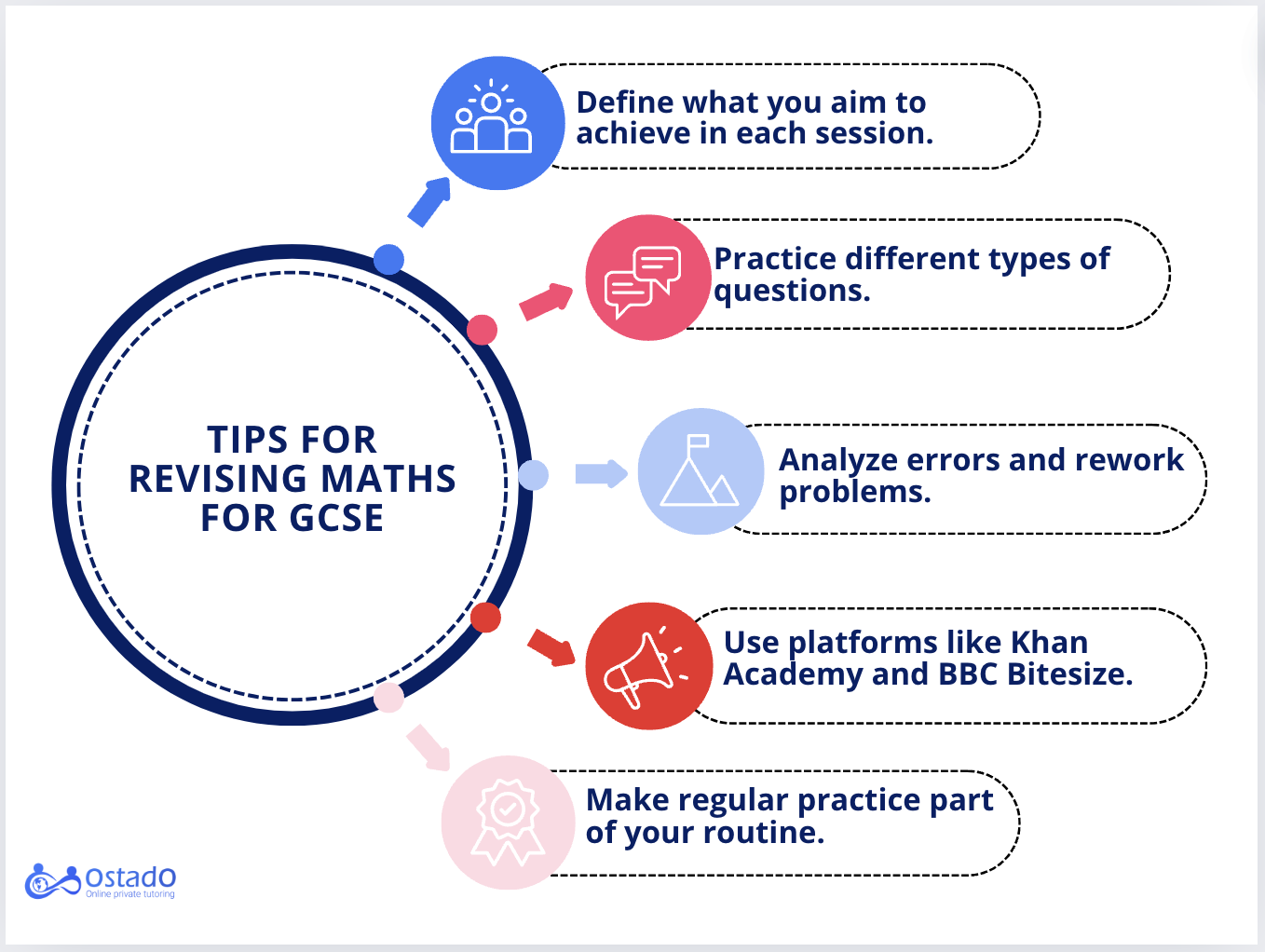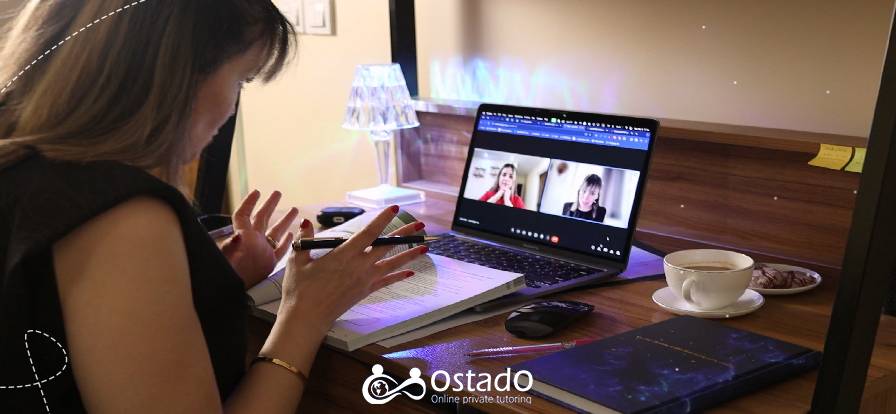As you know, students’ success in GCSE maths can have a great impact on their academic journey and future job opportunities. Achieving success in this process requires proper preparation for the exam and having an effective study and revision plan. You might be wondering what is the best way to revise for GCSE maths to guarantee your scores and knowledge foundation. This guide will provide 6 essential tips to consider when revising for GCSE maths. Stay tuned!
Tip 1. Set a Structured Study Schedule and Revision Plan
When wondering how to revise GCSE maths, creating a structured study schedule is one of the most effective ways to prepare for GCSE Maths. It helps you reduce your stress, stay on track, and ensure you cover all the important topics and set times for reviews. Here are the benefits of a well-structured revision plan:
- Consistency: Regular study sessions lead to better retention and understanding.
- Efficiency: Enhance your study time by focusing on specific topics.
- Motivation: Achieving small, manageable goals can boost your confidence and motivation.
- Stress Reduction: Knowing what to study and when can reduce your anxiety.
Create your revision timetables following these steps:
- Evaluate your current schedule and identify your free time by noting down school times and personal activities.
- Set clear goals on what you want to achieve after each study session.
- Assign specific times for study and use your most productive times in a day for complex topics.
- Schedule time to review what you’ve learned each week. This could be a quick review at the end of each study session or a dedicated review day.
- Split your study sessions into manageable blocks, focusing on different maths topics.
For example:
- Monday: Algebra and equations
- Tuesday: Geometry and shapes
- Wednesday: Statistics and probability
- Thursday: Trigonometry
- Friday: Revision and past papers
- Saturday: Number operations and fractions
- Sunday: Rest or light review
Sample Timetable for GCSE Maths Revision
| Time | Monday | Tuesday | Wednesday | Thursday | Friday | Saturday | Sunday |
| 4:00-5:00 PM | Algebra | Geometry | Statistics | Trigonometry | Revision | Number Ops | Rest/Review |
| 5:30-6:30 PM | Equations | Shapes | Probability | Trigonometry | Past Papers | Fractions | Rest/Review |
Also read: GCSE Maths Non-calculator Revision
Tip2. Utilise a Variety of Revision Resources
Using multiple revision resources can greatly enhance your understanding of GCSE Maths. These resources can include textbooks, online platforms, past papers, and the most important one, tutor support. Here are the advantages you can take and resources you can use to achieve better results.
Textbooks offer:
- Structured learning by following the syllabus logically.
- Practice problems and work through end-of-chapter exercises.
Online Platforms Such as:
- Use Ostado to find an experienced maths tutor
- By BBC Bitesize you can Use interactive lessons and quizzes.
- Maths Genie provides access to topic-specific resources and past papers.
Past Papers Provide:
- Familiarising with patterns: Get used to exam formats and question types.
- Timed Practice: Simulate exam conditions to improve time management.
- Review and evaluate: Identify and work on weak areas by reviewing mistakes.
Tutor Support Helps You
- Get personalised explanations according to your needs and knowledge background
- Have a focused learning by specifying your problems and weak areas to work on.
- Benefit from regular feedback, support, and guidance.
Don’t know what is the best way to revise GCSE maths and need a private GCSE maths tutor? Join Ostado and find your best tutor to help you succeed in your academic journey and get the best results on your GCSE exam.
Tip 3. Practise the Materials Regularly
Regular practice is the key to improving your scores in GCSE maths exams. Consistent and focused practice helps you have a better understanding of the concepts, improves your problem-solving skills, and builds your confidence. This can lead to reducing your stress and a better performance during the exam by having great retention of the concepts and formulas.

Need more guides on how to revise for GCSE maths? Follow the links and watch the videos for more detailed information:
Tip 4. Use Flashcards for Reviews
When it comes to memorising key concepts and formulas, flashcards are the most practical learning tools as they are portable and give you on-the-go review sessions during your break time.
Also, by spending a few times each day reviewing your flashcards, you’ll make sure you have all the necessary information in your mind.
How to use flashcards for key formulas?
- Create Flashcards: Write essential formulas and key concepts on flashcards. On one side, write the formula or concept, and on the other side, write a brief explanation or example.
- Categorise: Group flashcards by topics such as algebra, geometry, and trigonometry to make targeted review sessions easier.
Need a revision list for GCSE maths? This article provides you with the most practical steps on GCSE maths revision including a checklist file for GCSE maths topics and a timetable template as well.
Tip 5. Work on Your Weak Areas
- Identify Weaknesses: Evaluate your performance regularly to identify your weak areas and challenging topics. Then set extra time to work on these difficult areas to ensure you understand the underlying concepts and can solve related problems.
- Seek Help: Don’t hesitate to ask teachers for clarification and explanation as needed and work with your classmates to understand the concepts well. Your classmates can offer different perspectives and mutual support. If you need further support in your process, get a professional GCSE tutor to help you out!
Tip 6. Seek Group Study Sessions and Peer Support
Sharing different problem-solving techniques introduces you to various methods that might be more effective than your own. Productive discussions often lead to new insights, as explaining concepts to others can strengthen your own understanding.
To organise productive group study sessions, set clear goals for each meeting, and ensure everyone participates and contributes. Create a collaborative environment where all members feel comfortable asking questions and offering explanations, making the study process both efficient and enjoyable.
In conclusion, the GCSE revision process plays the most important role in your academic journey as the exam results can directly influence your career and educational opportunity. For this purpose, you’ll need to plan your revision schedule, use a variety of resources such as textbooks and online platforms, and practise the materials regularly to reinforce your understanding.
best way to revise for gcse maths
- How to do well in maths in GCSE?To do well in maths, you should Practise regularly, understand key concepts, and seek help when needed.
- How should I revise maths GCSE?Using past papers, textbooks, and online resources, and incorporating active learning techniques like flashcards and quizzes are the best methods to revise maths GCSE.
- How do I get better at maths GCSE?Focus on problem areas, seek clarification from teachers or peers, and maintain a positive attitude towards learning.

